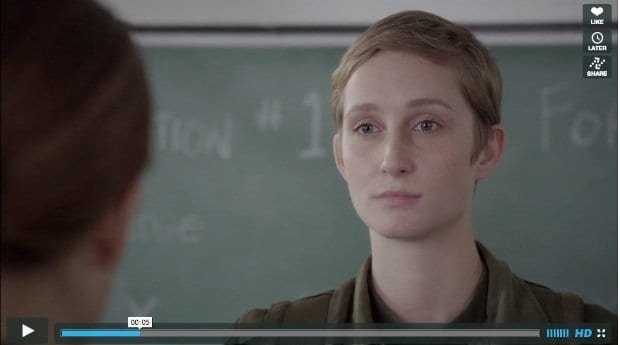A Nova Scotia member of Parliament and an award-winning film producer are joining forces to try, for the second time, to convince the federal government to apologize for discrimination against gay soldiers.
Filmmaker Cari Green (The Corporation, Scared Sacred) has written and shot a short fictional film about the dismissal of a gay soldier in the 1980s. She is now looking for funding to finish Citizen Jane and launch it on a film festival tour.
New Democratic Party MP Peter Stoffer, opposition critic for veterans, hopes the film and accompanying petition will finally prompt recognition of gay soldiers discharged because of their sexual orientation.
Canada reformed its policy on gay military service after officer Michelle Douglas brought a lawsuit against the government in 1989. Douglas graduated at the top of her officer training class and had just begun a promising career in the Air Force. She was assigned to the special investigations unit — ironically, the same unit that investigated allegations of homosexuality — when she came under scrutiny for spending too much time with a woman.
Like many gay Canadian soldiers, Douglas was ejected from the military for being “not advantageously employable” because of her homosexuality. Faced with the suit, the Canadian military agreed to drop its discriminatory policy, and the case never went to trial. The government never apologized for firing gay soldiers, however, or offered any kind of restitution.
Stoffer asked for an apology in 2009 but was rebuffed. Then-defence minister Peter McKay said, in a letter to writer Robin Anderson-Forbes, that the government could not retroactively change gay veterans’ records. He also argued that gay soldiers were usually dismissed as “not advantageously employable,” rather than dishonourably discharged, and that those dismissals were simply reflections of legislated rights at the time.
Stoffer still wants an apology but says this time he will be more prepared. When he asked for an apology in 2009, he says, journalists came to him for names of dismissed gay soldiers as representatives. Because homosexuality was seldom specifically cited as a reason for dismissal, gay veterans were difficult to find. Before he tries again, Stoffer says, he wants to track down more dismissed soldiers.
“I need to have those names,” he says. “I want to be more thorough. I want to have my ducks in a row.”
Green’s film, Citizen Jane, is also meant to drum up new interest in the old problem of gay discrimination in the military. Green, a documentary producer, originally approached Douglas to create a documentary. Douglas was not interested, so Green wrote her own fictional script about a lesbian soldier facing dismissal in the late 1980s.
Green thinks apologizing to dismissed gay soldiers would be an easy win for both the government and gay people. “It would be a fairly simple act to just acknowledge that the government made a mistake,” she says. “That’s the least thing the government could do now. The Harper government is under siege right now; this may be a goodwill gesture they could do.”
Stoffer also hopes publicity from the film will prompt more dismissed gay soldiers to talk about their experiences.
Even though life has improved dramatically for gay people in the Canadian military — the first gay military couple were married in 2005 — Green thinks it is important that former gay soldiers get the recognition they deserve. “Their service was not acknowledged, and they were sent packing,” she says. “They were sort of victimized twice.”
Green is running an Indiegogo campaign until Nov 27 to raise $35,000 to finish and distribute the film.


 Why you can trust Xtra
Why you can trust Xtra


